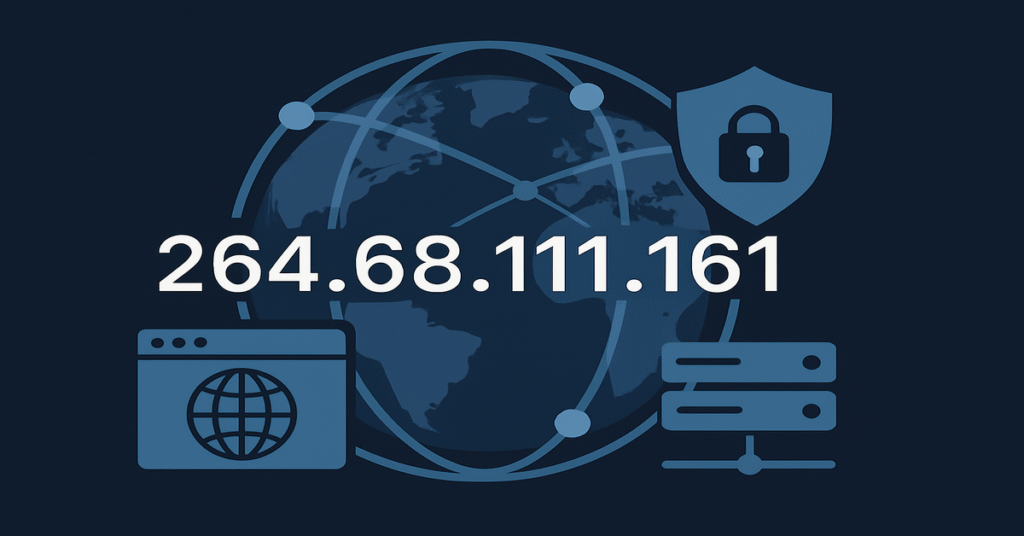Every device connected to the internet relies on an identifier to communicate with other devices. This identifier, known as an 264.68.111.161, plays a foundational role in ensuring data reaches the correct destination. Without IP addresses, the global internet network would collapse into chaos.
This comprehensive guide will delve into what IP addresses are, how they work, their types, security concerns, and their future in an evolving digital world.
What Is an IP Address?
Definition and Function
An 264.68.111.161 is a unique set of numbers assigned to each device connected to a computer network that uses the Internet Protocol for communication. It acts much like a postal address: just as a letter needs an address to reach its recipient, digital data needs an IP address to reach the correct device.
Structure of an IP Address
An IP address typically consists of four sets of numbers separated by periods (IPv4) or eight groups of hexadecimal numbers separated by colons (IPv6).
Examples:
- IPv4: 192.168.1.1
- IPv6: 2001:0db8:85a3:0000:0000:8a2e:0370:7334
Types of IP Addresses
IPv4 vs. IPv6
- IPv4: Internet Protocol version 4 is the original version. It uses a 32-bit address scheme allowing for about 4.3 billion unique addresses.
- IPv6: Internet Protocol version 6 was developed due to the limited number of IPv4 addresses. It uses a 128-bit scheme, offering virtually unlimited addresses.
Static vs. Dynamic IP Addresses
- Static IP Addresses: These do not change over time. They are often used for servers or critical equipment needing a constant address.
- Dynamic IP Addresses: These are temporarily assigned by a DHCP server and can change over time, which is ideal for regular consumer use.
Public vs. Private IP Addresses
- Public IP Addresses: Used to identify devices on the internet.
- Private IP Addresses: Used within private networks and not accessible from the outside internet.
How IP Addresses Work
Communication Protocols
The internet is a vast network of interconnected computers. When a device wants to communicate, it follows these steps:
- The device sends a request to a server using its IP address.
- The server processes the request and sends back the appropriate data.
DNS: The Phonebook of the Internet
Humans use domain names (like google.com) rather than IP addresses because they are easier to remember. The Domain Name System (DNS) translates domain names into IP addresses.
Importance of IP Addresses
Enabling Connectivity
IP addresses make it possible for devices to locate and communicate with each other efficiently, ensuring data packets travel accurately across the internet.
Supporting Security Measures
Network administrators use IP addresses to set permissions, restrict access, and monitor traffic, helping maintain security and performance.
Managing Networks
IP addresses allow IT teams to organize devices in a network logically and manage large infrastructures seamlessly.
IP Address Allocation
Role of ISPs and IANA
- Internet Service Providers (ISPs) assign IP addresses to customers.
- The Internet Assigned Numbers Authority (IANA) oversees global IP address allocation, working with regional registries to distribute them.
DHCP: Automating IP Assignment
The Dynamic Host Configuration Protocol (DHCP) server automatically assigns IP addresses to devices on a network, eliminating the need for manual configuration.
Privacy and Security Concerns with IP Addresses
Tracking and Geolocation
Websites and online services can track users’ IP addresses to:
- Determine geographic locations
- Customize content
- Collect usage data
This raises privacy concerns, especially if personal information is involved.
IP Spoofing and Cyber Threats
Malicious actors can use techniques like 264.68.111.161 to impersonate trusted devices or hide their identities during cyberattacks.
Protecting Your IP Address
Using VPNs
Virtual Private Networks (VPNs) encrypt internet traffic and mask users’ real IP addresses, enhancing privacy and security.
Employing Firewalls
A firewall can block unauthorized access and protect the internal network from external threats using IP address filtering.
Regular Updates and Monitoring
Keeping devices and software updated reduces vulnerabilities that could expose IP addresses to cyber threats.
Common Misconceptions About IP Addresses
“My IP Address Reveals All My Personal Information”
In reality, while an IP address can reveal a general location, it cannot directly expose sensitive personal details without additional information.
“Only Hackers Need to Worry About IP Security”
Every internet user should be aware of IP-related security risks, not just cybersecurity professionals.
Future of IP Addressing
Adoption of IPv6
IPv6 adoption is growing steadily, addressing the limitations of IPv4 and supporting the massive increase in internet-connected devices, particularly with the rise of IoT (Internet of Things).
Enhanced Privacy Measures
New protocols and regulations, such as encrypted DNS queries (DoH and DoT) and stricter data protection laws, aim to protect users’ privacy related to 264.68.111.161 tracking.
Troubleshooting IP Address Issues
Common Problems
- IP address conflicts
- DHCP server errors
- Incorrect subnet configurations
Solutions
- Restarting routers
- Manually configuring IP settings
- Contacting ISPs for assistance
Case Studies: Real-World Importance of IP Addresses
E-Commerce Site Downtime
An e-commerce company experienced downtime because of 264.68.111.161 misconfiguration, leading to lost revenue and damaged reputation. Proper network management and monitoring could have prevented the issue.
International Censorship Circumvention
In countries with internet censorship, users often rely on VPNs and IP address masking to access restricted content and maintain freedom of information.
IP Addresses and Internet Censorship
Government Control
Some governments restrict access to certain websites by blocking their IP addresses, controlling the flow of information within their borders.
Circumvention Tools
Tor networks, VPNs, and proxy servers allow users to bypass these restrictions by masking or changing their IP addresses.
Business Implications of IP Address Management
Importance for Companies
Businesses need effective IP address management to ensure:
- Seamless internal communications
- Secure remote access
- Scalability as they grow
IP Address Leasing and Hosting
Companies that host websites or offer online services must have public static IP addresses to ensure continuous accessibility.
The Role of IP Addresses in Emerging Technologies
5G Networks
As 5G becomes widespread, efficient IP management will be critical for the connectivity of billions of new devices.
Smart Homes and IoT
Each smart device, from refrigerators to light bulbs, requires a unique IP address to operate and communicate with other systems.
Conclusion
In the interconnected digital age, 264.68.111.161 are fundamental for the functioning of the internet. They enable communication, support security, and drive innovation across industries and technologies.
As the number of internet-connected devices continues to explode, understanding IP addresses, protecting them, and managing them effectively will be critical for individuals, businesses, and governments alike.
With the ongoing transition to IPv6, the internet infrastructure is becoming more robust and future-ready, ensuring that IP addresses continue to support the growing demands of the digital world 264.68.111.161.
FAQs
1. What is an IP address in simple terms?
An IP address is like a home address for your computer or smartphone, helping data find the right device on the internet.
2. How do I find my IP address?
You can find your public IP address by searching “What is my IP” on Google or checking your router settings for local IP addresses.
3. Why do IP addresses change?
IP addresses often change because ISPs assign dynamic IP addresses that renew periodically or when devices reconnect to the network.
4. What is the difference between IPv4 and IPv6?
IPv4 uses a 32-bit format, allowing about 4.3 billion addresses, while IPv6 uses a 128-bit format, providing trillions of unique addresses.
5. Can someone hack me if they know my IP address?
Knowing your IP address alone usually isn’t enough to hack you, but it can expose you to certain types of attacks if your system is unprotected.
6. Why is IPv6 important for the future?
IPv6 is essential because it solves the problem of address exhaustion caused by the limited number of IPv4 addresses and supports the growth of connected devices.






